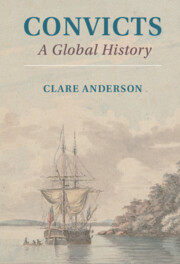Refine search
Actions for selected content:
2 results
1 - Introduction
-
- Book:
- Convicts
- Published online:
- 06 January 2022
- Print publication:
- 13 January 2022, pp 1-34
-
- Chapter
- Export citation

Convicts
- A Global History
-
- Published online:
- 06 January 2022
- Print publication:
- 13 January 2022
